Abstract
Features of economic and sociocultural development of the Russian society, political situation and international tensions, active development of statehood of the Russian Federation pose the need to search new ways of improvement of moral education of teenagers. Moral education of school students is of particular importance due to intensive development of information and communication technologies. The network resource fosters aggressive propaganda of ideas related to the culture of consumption, expression of violence, permissiveness, and promotes various forms of destructive behavior. Besides, the socialization of a teenager in modern society is inseparably linked with the development of information space, active use of the Internet for the solution of educational tasks. This contributes to the problem of moral education of teenagers since, on the one hand, they get access to big information bases, freely communicate on the Internet; on the other hand, the teenagers do not have fully developed criticality and conscious moral selectivity in perceiving the information. The paper presents the results of the study of moral education of teenagers alongside with thus applied information and communication technologies. The study was conducted via the questionnaire covering school students and subject-matter teachers. The paper describes the interactive educational methods such as virtual tours, web quests, games, multimedia courses, tests, electronic encyclopedias, textbooks, annexes to textbooks, the use of which creates favorable conditions for the introduction of universal and national moral values, as well as forms critical thinking and selectivity in perceiving the information by modern teenagers.
Keywords: Moral educationvalueseducational processschools
Introduction
The system of values of the Russian society underwent considerable transformations caused by social and economic changes in the country in the 1990s of the 20th century. After the collapse of the Soviet Union the former values lost their relevance, while the new ones did not gain their foothold yet thus causing the so-called “axiological vacuum”. This process continues until now. The transformation of post-industrial society into the information-oriented society poses the need for moral education of teenagers. The spirituality and morality give way to pragmatism more often (Voyevoda & Belogurov, 2018). Teachers and psychologists are concerned with the decrease of moral education of younger generation (Flake-Hobson, Robinson, & Skin, 1993; Schäffer, 2003). The family as a key institute of socialization of a personality does not always fully satisfy high demands of a society to moral education of teenagers. Today the family competes with mass media, in particular, with the global Internet regarding the educational influence on teenagers. At present, mass media represents a powerful social institute forming social values, ideas of social reality. Thus, the morality of modern Russian society is defined as critical. To some extent it is possible to compensate the influence of the above negative aspects by targeted moral education of the younger generation at schools.
Problem Statement
School students need moral bearings to survive in the contradictory modern world and in the global information space. School teachers face difficulties with moral education of teenagers due to devaluation of moral values, destruction of the system of out-of-class and out-of-school moral education that was strongly developed in the 1950-1980s of the 20th century, change of the sources of influence on younger generation (Gorelikov, 2018; Rachkovskaya, 2017). Today mass media and the Internet in particular, which is not limited to entertainment and communication, and quite often transmits stereotypes of immoral behavior, play a major role in the consciousness of the younger generation. Besides, the Internet and information and communication technologies contain considerable opportunities for the introduction of school student to universal moral values and new knowledge (Knyaginin, Meshkov, & Utolin, 2016; Proletarsky & Neusypin, 2014). This determines the problem of using extensive opportunities of the Internet in moral education of teenagers, as well as the need to develop their critical thinking and conscious attitude to received information.
Research Questions
We understand the moral education as the development of moral consciousness of a teenager through the assimilation of moral concepts and values, feelings, readiness for moral choice in controversial situations (Gebauer, 1997; Gorelikov, 2017). Moral education is aimed at the development of the best personal qualities (kindness, mercy, justice, civic consciousness, patriotism, historical and cultural awareness, belief in the fatherland, etc.). In this regard, moral education of a teenager is perceived as the formation of moral worldview, awareness of moral attitude to universal values, demonstration of moral feelings, conscientious and responsible behavior (Bondarevskaya, 2016; Efimenko, 2013).
Purpose of the Study
The purpose of the study is to define the level of moral education of modern teenagers and opportunities of the global Internet in the course of their moral upbringing.
Research Methods
The study was based on the questionnaire on the moral values of modern teenagers especially developed for school students. Besides, the online survey was conducted for secondary school teachers. The study was carried out in 2018 in Moscow Region (Russia) and covered 246 respondents, including 212 teenagers and 34 teachers. To ensure objectivity, the study was conducted for secondary school students of the fifth or ninth grades.
Findings
In the comprehensive survey of teenagers we were mainly interested in the attitude of teenagers to such major moral values as culture, religion, patriotism, civic consciousness, etc. It shall be noted that in general the teenagers are interested in the Russia history and culture (72% of respondents); they believe that multinationality of Russia improves its culture (65% of respondents); they have tolerant attitude to the representatives of different nationalities (67% of respondents); as a rule they know and accept such religious commandments as “Thou shalt not kill” and “Thou shalt not steal”.
At the same time, the following answers (Figure
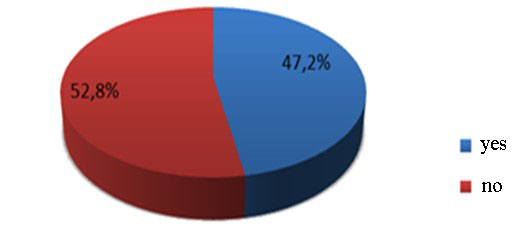
If to compare this with answers (Figure
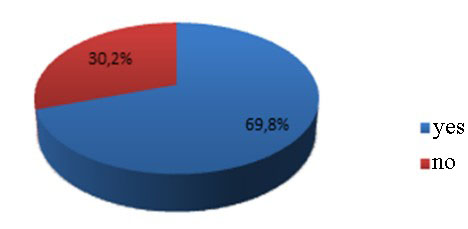
It is interesting to compare the following facts: 69% of respondents positioned themselves as the patriots of Russia; 71% of respondents had affirmative answers regarding their allegiance to the country. However, as the subsequent specifying questions showed, the teenagers managed to develop the simplified understanding of patriotism and civic consciousness. The main answer was the characteristic of patriotism as a general abstract love for the country. The patriotism according to teenagers did not correspond to the knowledge of culture and achievements of the homeland, to involvement in socially useful activity and social projects, to the pride of their belonging to the country.
In our opinion, the main reason for such understanding was the destruction of the system of moral education in classroom and extracurricular activities, weakness of moral education in families, disrespect for state values, traditions and rituals by some parents, as well as public figures, people of culture and show business in mass media. This confirms the need to develop critical thinking and conscious attitude to the obtained information among teenagers.
At the next stage of the study, we offered teachers to answer the following questions: 1) how important is the moral component in the educational process; 2) whether they consider moral education in extracurricular activities necessary; 3) what types of activities aimed at moral education of teenagers do they use.
It turned out that not all teachers attach due significance to a moral component in the course of teaching a subject considering that their main task is “to impart knowledge” (Figure
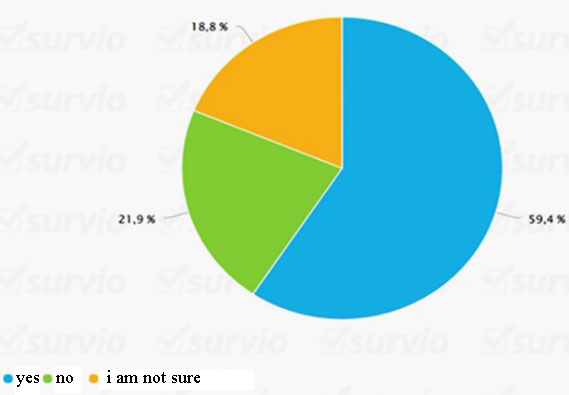
The majority of teachers considers it right to ensure moral education not during classes but exclusively within extracurricular activities (Figure
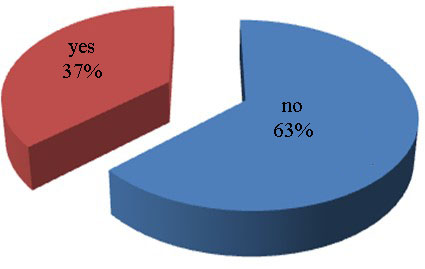
Among the types of creative activities focused on moral values that the teachers apply in classes the most popular were stories, explanations, lectures, and presentations. Only 41% of teachers referred to interactive methods, including dialogues, discussions and social projects (or their elements).
At the same time nearly 89% of teenagers (Figure
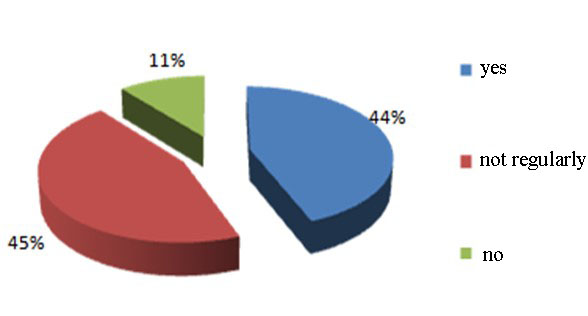
The results of questionnaires of teenagers and online survey of teachers made it possible to state that the opportunities of moral education are not fully implemented these days at schools. The negative factors preventing moral education of teenagers include the following: a) low motivation of school teachers for moral education (Kuzminov & Kuzminova, 2017); b) lack of unity of classroom and extracurricular activities within moral education; c) fragmentariness and spontaneity of information and communication technologies and the Internet to ensure moral education of teenagers; d) insufficiency of relations of a school with state, public, cultural organizations, and youth centers, which prevents the fulfillment of their potential for socially important project-based activities of teenagers.
Conclusion
Thus, the study makes it possible to draw a conclusion on the weakness of moral education of the younger generation at schools and an urgent need for moral guidelines. Besides, the information society opens up new opportunities for moral education of teenagers, which includes educational resources of the Internet and information and communication technologies. The appeal to the Internet requires the development of critical thinking and ability for moral expertise of obtained information. Information and communication technologies imply new forms of moral education both within classes and during extracurricular activities, such as virtual tours, web quest, games, multimedia courses, tests, electronic encyclopedias, textbooks, annexes to textbooks, the use of which creates favorable conditions for the introduction of universal and national moral values, as well as forms critical thinking and selectivity in perceiving the information by modern teenagers.
References
- Bondarevskaya, E.V. (2016). Humanitarian mission of education in the modern world. In Higher school: experience, problems, prospects. Materials of the 9th international scientific and practical conference: in 2 parts, part 1 (pp. 26–44). Moscow: Publishing house Peoples’ Friendship University of Russia.
- Chernilevsky, D. V., & Petrakova, T. I. (2010). Modernization of education based on spiritual and moral values. Higher education in Russia, 4, 143–147.
- Efimenko, V. N. (2013). The concept of “civil identity” in humanities. In Theory and practice of modern humanities and natural sciences. Collection of scientific articles of the 13th annual interregional scientific and practical conference. Kamchatka State University named after Vitus Bering, Kamchatka Regional Association – Educational Scientific Center (pp. 39–42). Petropavlovsk-Kamchatsky: Publishing house Kamchatka State University named after Vitus Bering.
- Flake- Hobson, K., Robinson, B. E., & Skin, P. (1993). Development of a child and its relations with people around. Moscow: Center of universal human values.
- Gebauer, K. (1997). Turbulenzen im Klassenzimmer. Emotionales Lernen in der Schule. Stuttgart: Klett-Cotta.
- Gorelikov, M. I. (2017). Features of spiritual and moral education of a teenager in modern conditions of socialization. Bulletin of Moscow State Regional University, ser. Pedagogics, 3, 27–34.
- Gorelikov, M. I. (2018). Psychology and pedagogical portrait of a modern teenager. Bulletin of the Moscow State Regional University, ser. Pedagogics, 4, 29–38.
- Knyaginin, V. N., Meshkov, N. A., & Utolin, K. V. (2016). Advanced Education in the Information Society. International Review of Management and Marketing, 6(S3), 89-99.
- Kuzminov, N. N., & Kuzminova, A. N. (2017). Competence-based approach to education of pedagogical staff as a condition of future professional demand. In Collection of works. Articles of teachers, undergraduates and bachelor students of Moscow social teacher training college (pp. 18–21). Moscow: Publishing house LLC Bely Veter.
- Petrakova, T. I. (2014). Content of education: spiritual and moral aspect. Bulletin of Moscow State Regional Institute of Humanities, ser. Philology. Linguistics and cross-cultural communication, 1, 50–57.
- Proletarsky, A. V., & Neusypin, K. A. (2014). Features of using modern information technologies in education. European Social Science Journal, 1–1(40), 63-65.
- Rachkovskaya, N. A. (2017). Modernization of the cultural function of education in polycultural school environment. Bulletin of Moscow State Regional University. Series: Pedagogics, 1, 29–37.
- Rachkovskaya, N. A., & Serovetnikova, S. A. (2014). Teaching core values to school students within educational activity (on the example of mathematics). In Fundamental and applied research: problems and results. Works of the international scientific and practical conference (pp. 52–60). Moscow: Publishing house Moscow State Regional University.
- Schäffer, (2003). Children teenagers: psychology of development. St. Petersburg: Piter.
- Voyevoda, E. V., & Belogurov, A. Yu. (2018). Axiology of education in a discourse of modern policy. Polis. Political studies, 6, 172–179.
Copyright information

This work is licensed under a Creative Commons Attribution-NonCommercial-NoDerivatives 4.0 International License.
About this article
Publication Date
28 December 2019
Article Doi
eBook ISBN
978-1-80296-075-4
Publisher
Future Academy
Volume
76
Print ISBN (optional)
-
Edition Number
1st Edition
Pages
1-3763
Subjects
Sociolinguistics, linguistics, semantics, discourse analysis, science, technology, society
Cite this article as:
Minazova*, Z., Rachkovskaya, N., Muskhanova, I., Lechiyeva, M., & Nasugayeva, A. (2019). Moral Education Of Teenagers At Schools. In D. Karim-Sultanovich Bataev, S. Aidievich Gapurov, A. Dogievich Osmaev, V. Khumaidovich Akaev, L. Musaevna Idigova, M. Rukmanovich Ovhadov, A. Ruslanovich Salgiriev, & M. Muslamovna Betilmerzaeva (Eds.), Social and Cultural Transformations in the Context of Modern Globalism, vol 76. European Proceedings of Social and Behavioural Sciences (pp. 2276-2282). Future Academy. https://doi.org/10.15405/epsbs.2019.12.04.303
